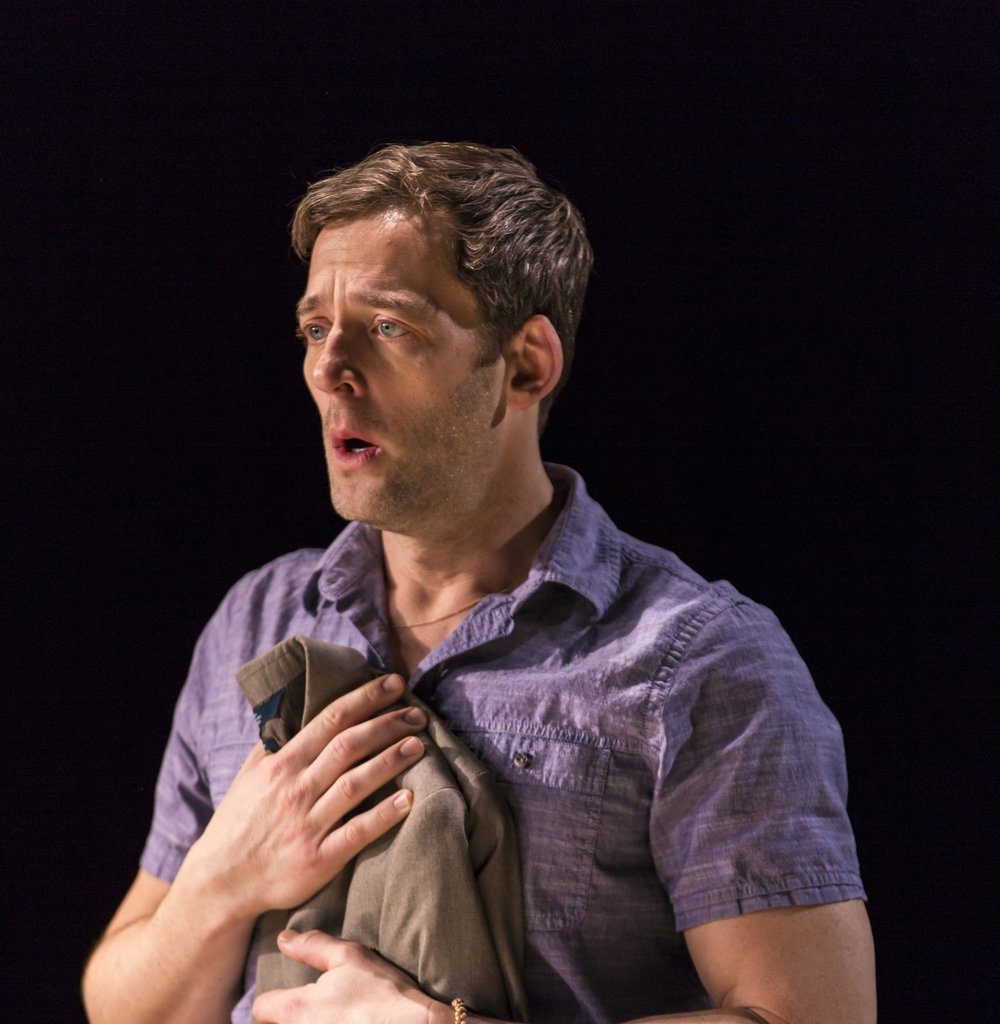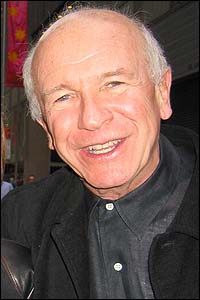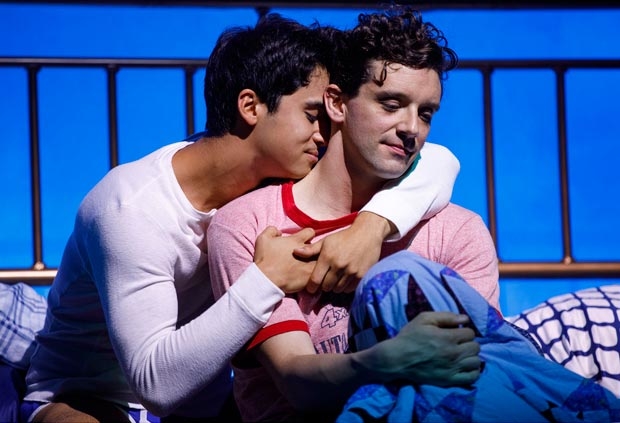 The first thing I noticed at HERE Art Center in Tribeca last month was a crowd of mostly white, middle-aged, New York literati types. And while normally this would be an irrelevant detail, the play in this case was Travis Russ’ America Is Hard to See, a meta-textual experiment in which the audience is as much a part of the play as the actors and set. In his latest production from Life Jacket Theatre Company, the plot has a way of entangling us into a world we would much rather keep at a safe distance, while simultaneously laying bare our perverse cultural appetite for the spectacle of criminality.
The first thing I noticed at HERE Art Center in Tribeca last month was a crowd of mostly white, middle-aged, New York literati types. And while normally this would be an irrelevant detail, the play in this case was Travis Russ’ America Is Hard to See, a meta-textual experiment in which the audience is as much a part of the play as the actors and set. In his latest production from Life Jacket Theatre Company, the plot has a way of entangling us into a world we would much rather keep at a safe distance, while simultaneously laying bare our perverse cultural appetite for the spectacle of criminality.
Based on hours of transcribed interviews by a team of artists-turned-researchers, this piece of documentary playwriting provides a complicated—and at times sympathetic—glimpse into the lives of one of the most loathed groups in America: registered sex offenders. Set in Miracle Village, a remote community in southern Florida, we encounter what appears on the surface to be Anytown USA. The set is minimal, comprised of an empty stage where musical instruments weave in and out of scenes to accompany original folk songs. Likewise, the troupe is small, just six actors deep.
The characters in the opening scene describe the banality of small-town life. “There’s only one stoplight!” they laugh. As we piece together their backstories, we learn that after years behind bars, life on the outside isn’t exactly free. State laws placing residency restrictions on the distance convicted sex offenders can live from schools, for example, means the men of Miracle Village are sentenced to a decade in this secluded town, during which time they are forced to wear GPS tracking devices on their ankles and are prohibited from crossing the county line.
 Though they all face the same punishment, the men’s crimes are vastly different. In court-mandated therapy sessions, the 22-year-old who was caught having sex with his 14-year-old girlfriend sits next to a man who admits to molesting his step-granddaughter. Another character, Chad, is a former high school choir teacher whose passion for music is obvious. Yet when he mentions one male student, in particular, his zealousness turns into something else, something intensely felt yet forbidden. After his affair was discovered, he was forced to resign and decided to have a go at gay conversion therapy. His naïveté—that his relationship had any future; that therapy could change his desires; or that honesty was the best policy with ex-gay counselors—is what ultimately condemned him to life on the sex offender registry.
Though they all face the same punishment, the men’s crimes are vastly different. In court-mandated therapy sessions, the 22-year-old who was caught having sex with his 14-year-old girlfriend sits next to a man who admits to molesting his step-granddaughter. Another character, Chad, is a former high school choir teacher whose passion for music is obvious. Yet when he mentions one male student, in particular, his zealousness turns into something else, something intensely felt yet forbidden. After his affair was discovered, he was forced to resign and decided to have a go at gay conversion therapy. His naïveté—that his relationship had any future; that therapy could change his desires; or that honesty was the best policy with ex-gay counselors—is what ultimately condemned him to life on the sex offender registry.
The homey atmosphere is relaxing, but Russ doesn’t let us, the audience, revel in the charm for long. Just as we settle in, characters interrupt the action and call out all of us intrusive New York literati types directly. “Is all of this going into the play?” one nervously asks. The effect is disarming, leaving you feeling more of an accomplice than a spectator.
The most uncomfortable moment comes when a voice reads from a police transcript detailing Chad’s crimes while he repeatedly yells “Stop!” The audience squirms as Chad’s shame is projected onto us and the lines of consent are inexorably blurred. An ethnographer in the field could not get away with such gross ethical infractions, but Russ’ indifferent narrator is undeterred by Chad’s public humiliation. The quasi-inmate status of the characters demands a certain performance of pain and remorse. In this way, the artistic license taken with the play’s hostage subjects turns us all into the predators we’ve paid to entertain us.
The “sex offender” is a recent socio-legal construct. The Wetterling Act and Megan’s Law, which both helped create the conditions for Miracle Village and other communities like it, date back to the wave of criminal justice reforms adopted by Congress in 1994. Since that time, a number of states have passed laws to broaden the definition of sex offender. The consequences, according to Roger Lancaster, author of Sex Panic and the Punitive State, have been devastating. “Such provisions were prompted as applying to the ‘worst of the worst’ like child rapists and violent repeat offenders,” he writes in The New York Times. “In practice, they turn expansive classes of people into pariah outcasts who can never be reintegrated back into society.”
That we are a culture obsessed with crime stories—and with sex crimes in particular—is no secret. Dateline’s To Catch a Predator and Fox News host Nancy Grace are but two examples that quickly come to mind. Fueled by sensationalized media reports, such knee-jerk legislation not only fails to combat sexual violence but also has been shown, ironically enough, to encourage recidivism. With no hope of re-entering society post-conviction, sex offenders have nothing to lose.
 The absent narrator of America is Hard to See fills in as the public’s moral compass, one exposed as glaringly bankrupt. Despite his thorny ethical relationship to documenting real life, Russ brilliantly questions the artificial divide between reality and fiction, participant and observer, and between lies and the truth itself. “This play of yours, it’s filled with … what do you call it? Unreliable narrators,” the town social worker interrupts during a group therapy session. Is this drama or investigative journalism, entertainment or “fake news”? And how can anyone tell the difference?
The absent narrator of America is Hard to See fills in as the public’s moral compass, one exposed as glaringly bankrupt. Despite his thorny ethical relationship to documenting real life, Russ brilliantly questions the artificial divide between reality and fiction, participant and observer, and between lies and the truth itself. “This play of yours, it’s filled with … what do you call it? Unreliable narrators,” the town social worker interrupts during a group therapy session. Is this drama or investigative journalism, entertainment or “fake news”? And how can anyone tell the difference?
The audience cannot walk away from this piece without feeling incredibly uncomfortable and morally compromised. In her classic essay, “Thinking Sex: Notes for a Radical Theory of the Politics of Sexuality,” feminist scholar Gayle Rubin warns: “Moral panics rarely alleviate any real problem because they are aimed at chimeras and signifiers.” In this heartbreaking play, Russ puts the spotlight directly on the chimeras and obfuscates what exactly they signify. That is the real driving force behind the play, a force not easily forgotten after the curtain is drawn and our eyes look away from the stage. America, it seems, is indeed very hard to see.
America is Hard to See ran at the HERE Art Center in Manhattan from January 30 to February 24.
Zach Shultz is an administrator at a law school in New York City and a freelance writer. He maintains a blog about queer politics and culture at kafkasdoor.com.





